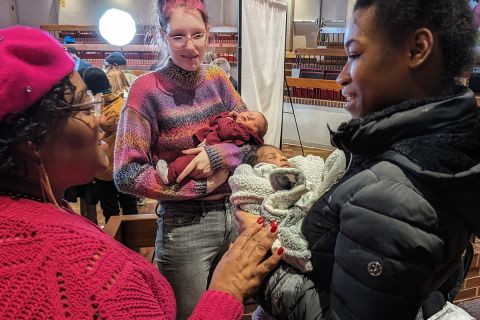- cross-posted to:
- [email protected]
- cross-posted to:
- [email protected]
FLINT—Eight days after entering the world, Khi’Meir Taylor made another debut — this time in what could be a national spotlight.
Wednesday was the first day of a $55 million experiment to test whether cash payments can protect children from the toxic stress of poverty.



I’m more interested in paying for domestic and reproductive work i.e. paying people to take care of their kids, cook their meals, mow their lawns, take out their trash, etc. Society can only function on the back of this unpaid labor after all.
UBI is okay too, though.
I get what you’re saying, but at the same time, the income isn’t replacing your entire income. I see more as supplemental income, kind of like a monthly food allowance where people won’t have to worry about struggling for basic necessities.
Even parents who work 9-5 still need to do a ton of work around the home and for their children. That would also fulfill the supplemental role.
But more importantly, it would actually compensate people for the work they need to do to be part of society and keep it running.
I don’t think that limiting this help to parents is the right plan. Doing that as a test, fine, but requiring people to have children to get financial assistance is not right.
Who said anything about limiting it to parents?
If you care for a relative you have to do all the same shit, and even if you live alone you still have to do things like cook and clean. Then if you’re really industrious there’s things like repairing your own car, mending your own clothes, growing your own food, etc.
We all do domestic labor, even if we don’t have children. Having children would just increase the work load, and thus pay scale.
Again, I get the sentiment, but that form of system, especially seeing how you’re explaining it, seems to create more problems than solve. How would one account for what they have done? It also seems that a system like this would be ripe for abuse.
Abuse as in, someone being paid for work they didn’t do? That’s… literally what UBI is lol
I will say that, while I prefer domestic and reproductive labor being compensated, I acknowledge it’s not a simple problem. It would work in a highly communal society where people have very little time to themselves, since we’d all just see each other doing a good job. It would also work in a mass surveillance society since we’d all be watched 24/7, but that’s not exactly good lol
UBI is fine. I’m just grumpy because its not perfectly fair.
UBI is perfectly fair. The benefits to the lowest incomes is massively higher than the benefit to the wealthy while being a simple system that does not require any complex overhead to make sure the ‘right’ people are receiving it. The same as with public parks, roads, schools, fire departments, and any other public thing available to everyone that is paid through taxes.
Public parks and roads and schools and fire departments all have overhead to make sure they’re being used correctly and being used by the people who should be using them. Letting someone who literally plays video games all day draw from UBI is like letting adults continue attending public school after they graduate, or the fire department blasting a house with water when it isn’t on fire. They don’t need it.
Okay, then how is this different from UBI? Are you supposed to keep a log of what you cleaned that day?
Hypothetically, someone who literally plays video games all day and doesn’t clean up after themselves wouldn’t get any income.
You raise a good point, though, that measuring domestic labor is hard. I spend an hour in the garden, was that because it was an hour of work or because I was working at a leisurely pace? I spent an hour vacuuming the house, is a government inspector going to come check? It’s not a practical idea unless mass surveillance gets to a point where there’s a camera in your eye that reports to the government lol
So like I said, UBI is fine. I just wish there was a way to compensate unpaid domestic and reproductive labor. That would be more fair.
UBI achieves that because the person who does those things still gets an income without needing a job.
Yeah, and so does the person who doesn’t do those things. They receive the same amount, even though one person does more labor. Unfair.